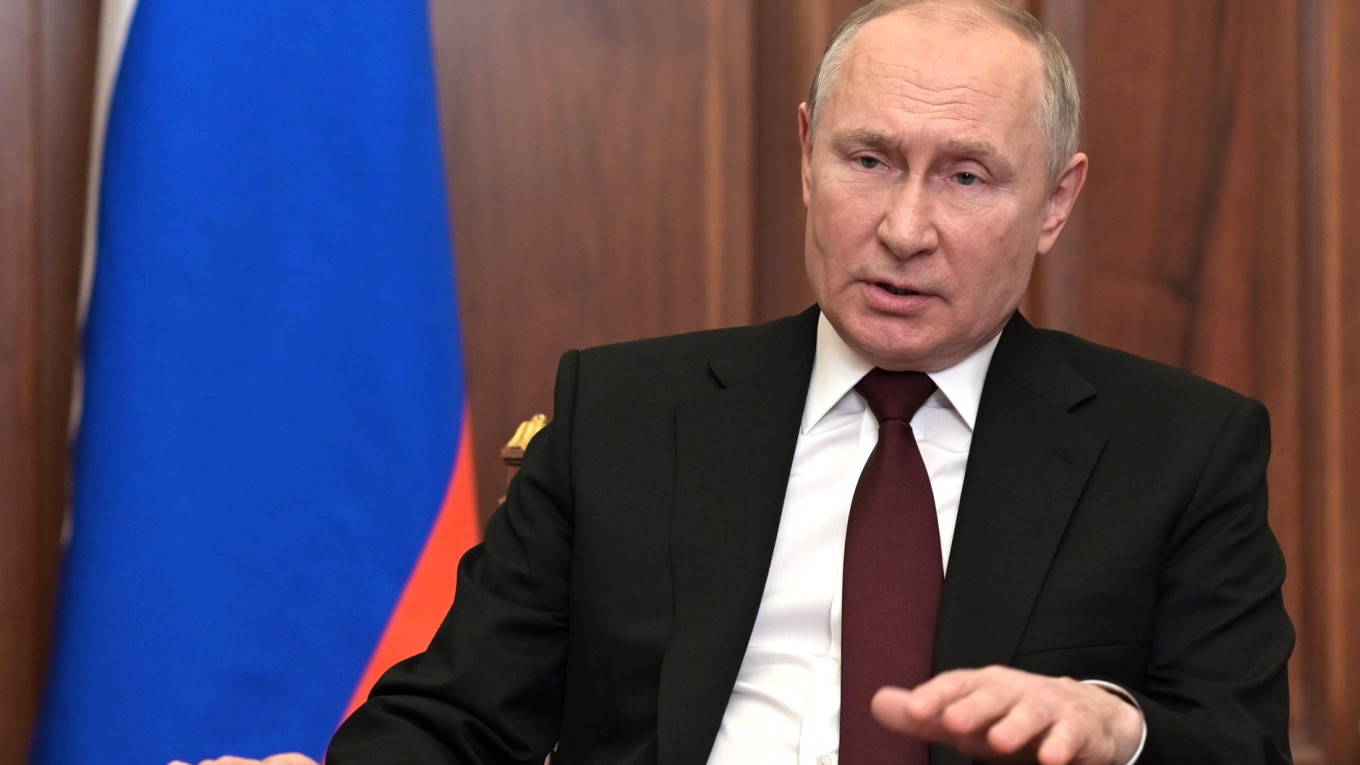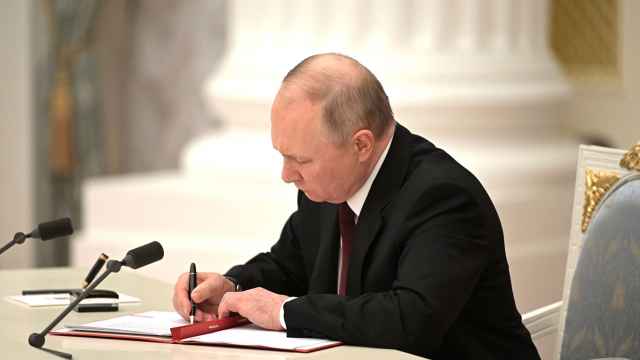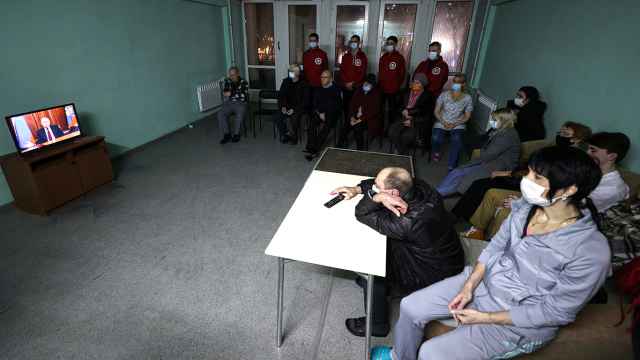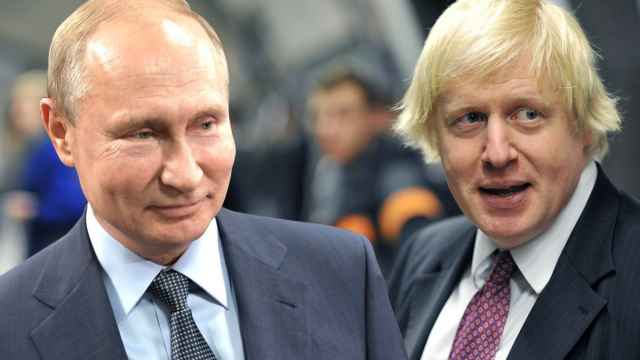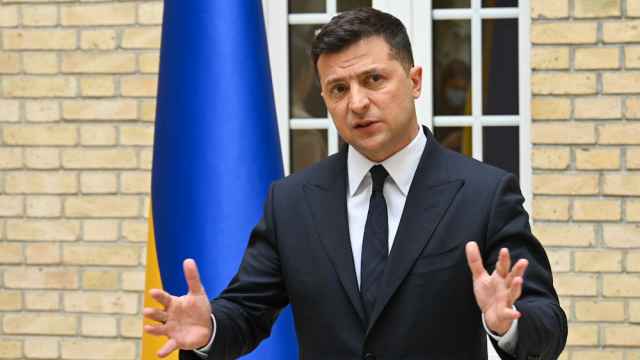President Vladimir Putin pitched Moscow as a defender of its historical motherland on a crusade to protect Russians and Russian speakers from “genocide” as he justified the dramatic decision to recognize the independence of pro-Russian separatsts in Eastern Ukraine late on Monday.
In an hour-long emotional, and occasionally angry, address to the nation, Putin outlined his interpretation of Ukrainian history and what he sees as persecution of Russians in the Donbas, concluding that he was left with no choice but to recognize the breakaway regions of Donetsk and Luhansk as independent states.
“The West acts as if there are no horrors and no genocide, to which almost four million people are being subjected,” Putin said in the closing remarks of his address, speaking from behind a desk in his office.
“How long can this tragedy continue? How much longer can we stomach it?”
“They are fighting for their basic rights — to live on their own land, to speak their own language, to preserve their culture and traditions,” he added, in reference to the Donbas residents.
In Putin’s telling, that is a “culture and tradition” inherently Russian in nature, since he has repeatedly expressed skepticism toward the idea of a separate Ukrainian historical identity.
Putin also dedicated lengthy sections of his speech to undermining Ukraine’s sovereignty — describing Kyiv’s status as the capital of an independent sovereign country as little more than a gift from Moscow. The implication being that it is Moscow’s to potentially take back.
“Modern Ukraine was completely and wholly created by Russia,” Putin said Monday, before diving into a lengthy description of Vladimir Lenin’s decision to “create” Ukraine shortly after the Russian Revolution in 1917.
The speech drew heavily on patriotic and nationalistic language, with the formal recognition — ratified Tuesday by Russia’s parliament — coming a day before Russia’s annual “Defenders of the Fatherland” public holiday, a Soviet-era celebration of the country’s armed forces.
Eventually turning to the current standoff, he accused leaders in Kyiv of escalating the situation in the eastern part of Ukraine, saying they have “embarked on the path of violence, bloodshed, lawlessness, and they do not recognize any other solution to the Donbass issue, except a military one.”
Revisionism
The speech was the culmination of a years-long campaign by Putin to rewrite the history of the Russian-Ukrainian relationship, experts said.
Prior to Monday’s address, Putin’s most substantial thinking on the Ukraine issue had been outlined in a lengthy essay — “on the historical unity of Russians and Ukranians” — published last July.
Analysts saw a clear line between that essay and the content of Monday’s speech. But many fear the immediate act — recognition of the Donetsk and Luhansk Peoples’ Republics — is far from the extent of Putin’s true ambitions. Instead, Putin placed the recognition of the republics in a much larger framework of a Russian maximalism, which might be unable to stop at the borders of the Donbas.
“This will affect not only Ukraine, but other ex-Soviet countries — starting with Belarus and Moldova and ending with Kazakhstan and the rest of Central Asia,” said political scientist Ilya Graschenkov.
“Recognizing the DPR and the LPR seems to be only a small episode in the much larger issue of restoring the Soviet Union — if not to its previous borders, at least in the format of a mini-U.S.S.R.”
Separatist leaders — seen in the West as puppet governments controlled by Moscow — also hailed the “historic significance” and wider importance of Monday’s decision.
“The Russian President has embodied the will of the Russians and the will of the Russian people for unity,” DPR leader Denis Pushilin wrote on his Telegram channel following a signing ceremony in Moscow.
“Now we will be able … to contribute to the strengthening of the Russian world.”
Putin’s interpretation of Ukrainian history — a combination of cherry-picking facts, purposeful misinterpretation and conspiracy theories — has been dismissed by experts as a “dangerously distorted reading of the past.”
On Monday, as Ukrainians watched Putin once again redraw the map of their country, there was little patience with his interpretation of events.
“We and our state do not have time for long lectures on history,” Ukrainian President Volodymr Zelenskiy said in his own address to the nation Tuesday.
“We are on our own land, we are not afraid of anything or anyone. We owe nothing to anyone and we will not give anything to anyone.”
Public response
What Russians themselves think of Putin’s actions is still up for interpretation, analysts say. Independent polling shows the Donbas is not Crimea — the annexation of which was widely popular and provided a long-lasting boost to Putin’s approval ratings, even as the economy slumped and Russians became poorer.
“Putin is mistaken about the degree of potential support for the ‘Russian rescue operation’ in Ukraine, which will inevitably follow,” said political analyst Tatiana Stanovaya.
“He deeply overestimates the level of support that the Russian population will give him. There will be no protests … but he will not receive broad support either.”
Others see in recognition a half-fulfilled idea that will leave even Putin’s most ardent supporters dissatisfied.
“There will be about a quarter — maybe a third — of the country who still sincerely buy into the Kremlin's patriotic rhetoric. But one question will be a thorn in their hearts: ‘Why did we only recognize them, and not accept them into Russia?’ That feeling of half-heartedness will somewhat spoil this potential feast,” said political scientist Abbas Galyamov.
“The restoration of the Donbas will require trillions, not to mention the maintenance of peace there. With our stagnating economy, this will not be easy,” Graschenkov wrote in a Telegram post. “Given that the euphoria of another victory … will soon subside, and a pile of problems will rapidly catch up with us, the geopolitical success could become a source of discontent.”
Looming over the issue of recognition is the fact that this move still falls far short of Putin’s purported concerns about NATO’s expansion into eastern Europe and will do little to address the flow of weapons into Ukraine and other countries neighboring Russia that the Russian leader has railed against.
There are few signs that recognition is Putin’s end game.
His message to Zelenskiy at the end of his address is being seen as a chilling marker of what could follow.
“From those who have seized and are holding power in Kyiv, we demand an immediate cessation of hostilities,” Putin said, moments after announcing his plans to recognize the breakaway states.
“Otherwise, full responsibility for any more bloodshed will be entirely on the conscience of the regime in power on the territory of Ukraine.”
A Message from The Moscow Times:
Dear readers,
We are facing unprecedented challenges. Russia's Prosecutor General's Office has designated The Moscow Times as an "undesirable" organization, criminalizing our work and putting our staff at risk of prosecution. This follows our earlier unjust labeling as a "foreign agent."
These actions are direct attempts to silence independent journalism in Russia. The authorities claim our work "discredits the decisions of the Russian leadership." We see things differently: we strive to provide accurate, unbiased reporting on Russia.
We, the journalists of The Moscow Times, refuse to be silenced. But to continue our work, we need your help.
Your support, no matter how small, makes a world of difference. If you can, please support us monthly starting from just $2. It's quick to set up, and every contribution makes a significant impact.
By supporting The Moscow Times, you're defending open, independent journalism in the face of repression. Thank you for standing with us.
Remind me later.



